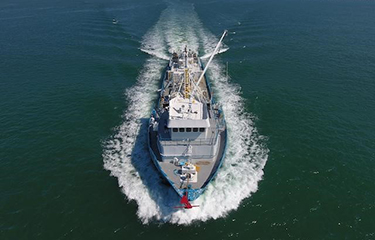Omega Protein signals intention to exceed Chesapeake Bay menhaden cap

Omega Protein, which recently attained MSC certification for the Atlantic menhaden fishery, has signaled it will likely exceed a cap for the species in the Chesapeake Bay.
The cap was initially suggested by the Atlantic States Marine Fishery Commission (ASMFC) in 2006, and was modified in 2012 to a 87,216 metric ton (MT) quota. However, in 2017, the ASMFC recommended cutting the cap by over 40 percent to 51,000 MT, a decision that Omega Protein objected to.
That led to a conflict between Omega Protein, the state of Virginia, and the ASMFC. The menhaden fishery in Virginia is unique, in that the state can decide the quota in the Chesapeake Bay. It did just that in 2018, when the state legislature decided not to codify the ASMFC’s recommendation of a quota cut in the bay to 51,000 MT, which then had the ASMFC put the state on notice, a decision that Omega Protein was critical of.
Despite the state being put on notice, the ASMFC tabled any action on Virginia’s noncompliance with the suggested quota, and the council later suspended taking any action against Virginia entirely.
Throughout the back-and-forth, Omega Protein has asserted that the quotas were never based on science, and that the initial quotas were political compromises.
“The ASMFC's Bay cap was initially implemented in 2006 at just over 109,000 metric tons (mt) as a political compromise, not as a scientific necessity,” wrote Omega Protein in a release addressing their anticipation of exceeding the Chesapeake Bay limits. “The ASMFC wrote at the time that the cap was "precautionary and not based on a scientifically quantified harvest threshold, fishery health index, or fishery population level study."”
The season this year, Omega Protein states, has had adverse conditions for fishermen outside of the bay. Those poor conditions have coincided with an “abundance of menhaden in the bay,” leading to the likelihood of exceeding the 51,000 MT recommendation.
“Omega Protein has great respect for the ASMFC, its commissioners and its staff. But this was a rare situation in which the Commission made an unscientific and arbitrary recommendation, which would have resulted in either forced, unsafe fishing conditions or economic hardship for hardworking fishing families,” Omega Protein wrote. “. Risking our employees' safety is never a choice we will make. With our employees' livelihoods and the economic well-being of Reedville, Virginia and the surrounding Northern Neck region on the line, shutting down operations was not a viable alternative.”
The commission, however, contests Omega Protein’s assertion that the quota was entirely political.
“I would contest it wasn’t arbitrary number, it was actually based on the five-year average of previous fishery performance, or landings, by the reduction fishery in the bay,” Tina Berger, the director of communications for the commission, told SeafoodSource.
Setting the menhaden cap has been a challenge the commission has been grappling with for over a decade. When amendment 3 – which initially set the caps for the Chesapeake Bay – was in the works, the commission received “over 100,000 comments,” according to Berger.
Creating an accurate quota for the bay may become easier in the coming months, as the species is under two different stock assessments: One taking the species on its own and one using ecological reference points. The ASMFC will meet in October and will get an update on both assessments, and once all assessments are complete the board will have more scientific data on which to base any future decisions.
Those decisions, however, will still be anything but easy.
“This is not going to be an easy decision, and I don’t see a clear consensus for one path or the other,” Berger said.
As for the current move by Omega Protein to exceed the 51,000 MT cap, the ASMFC’s future actions have a few paths forward.
“There’s two decision points they have, or two possible actions they could take, one would be to initiate a non-compliance finding. The other would be to delay further action until February until they have those assessments in front of them,” Berger said.
If a non-compliance finding is initiated, whether anything comes from it is also still an unknown.
“We have no control over how the secretary of commerce will respond if we move forward with a noncompliance finding,” Berger said.
Despite asserting it will exceed the current 51,000 MT cap, Omega Protein has maintained it will stay underneath Virginia’s current cap of 87,216 MT.
Photo courtesy of Omega Protein






Share